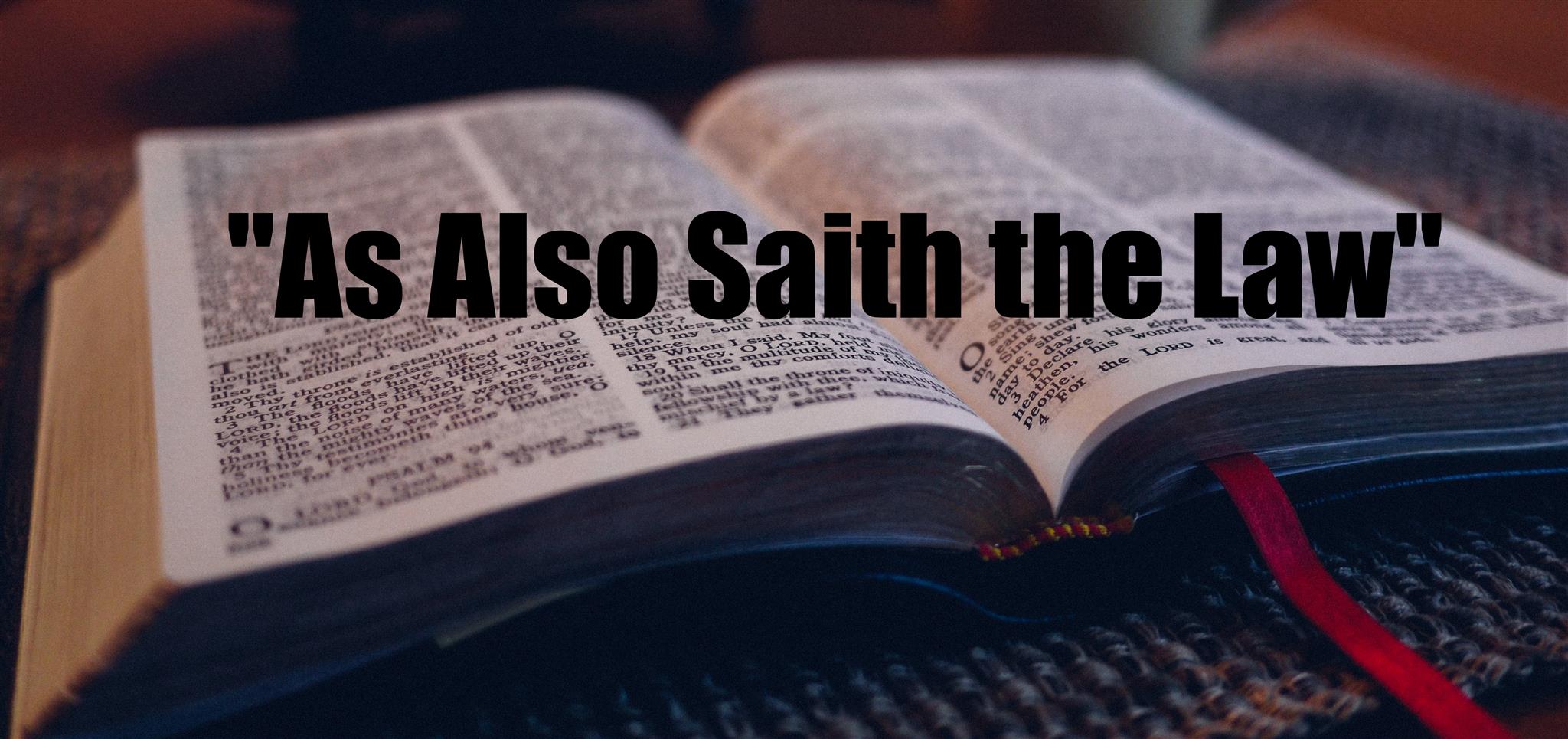As Also Saith The Law

1 Corinthians 14:34 Let your women keep silence in the churches: for it is not permitted unto them to speak; but they are commanded to be under obedience, as also saith the law.
I have read several places recently that Paul must have been referencing Greek or Roman civil law here, not God's law or the Old Testament. I find this indefensible for a number of reasons.
- Paul uses the word "nomos" (law) 120 times in his letters. 8 times he clearly indicates he is talking about a type of law other than current civil law or the OT. (E.g. law of sin, law of faith.) In 111 it is demonstrable by context that he means the Pentateuch or the OT in general. 0 times does he use it to refer to the law of the land. Assuming that in this last case he suddenly changes his predominant usage of the word without adding a clarifying phrase is unjustifiable.
- Paul uses the word "nomos" together with "lego" ("saith the law") or with "grapho" ("it is written") in 6 verses. In 5 of them he is appealing to the OT as an authority to back up what he is saying. The last one is in the verse in question where he is appealing to "the law" as an authority again. With nothing textual to indicate otherwise, it is pretty arbitrary to believe he isn't making a claim based on the OT here.
- In fact, one of the instances where he quotes the OT as an authority calling it "the law" is only 13 verses earlier in the same chapter and another one is in chapter 9 of the same book. If he has already appealed to the OT as a source in the same book, why wouldn't he do it again here?
- Paul tells Timothy in 2 Timothy 3:16 that, "All scripture is given by inspiration of God, and is profitable for doctrine, for reproof, for correction, for instruction in righteousness." So if Paul instructs Timothy to use OT scripture as his source for teaching righteous behavior, it seems he would be very comfortable doing the same himself.
- Three verses after the one in question, Paul says, "If any man think himself to be a prophet, or spiritual, let him acknowledge that the things that I write unto you are the commandments of the Lord," which is much more fitting with him having just claimed authority from the law of God rather than a law of man.
The best single passage in the OT that fits the bill for what Paul is referring to in the law is Genesis 3:16 where God says to the woman, "thy desire shall be to thy husband, and he shall rule over thee. One of the articles I read posed a few objections to this being what Paul is referring to so I've dealt with them below.
- Objection: The passage in Genesis can't be what Paul meant since "the law" of Moses wasn't given until Exodus.
- Actually, as I pointed out above, just a few verses earlier, Paul says, "In the law it is written, With men of other tongues and other lips will I speak unto this people; and yet for all that will they not hear me, saith Yahweh." This quote is from Isaiah which is well after Moses died. This makes it evident that Paul felt comfortable referring to all of the inspired OT as "the law."
- Abraham is also referred to in Genesis 26:5 as having kept God's law well before it was spoken to Moses so "the law" was known at least in part before Exodus.
- Objection: This is part of the curse, so Paul wouldn't refer to it as support for his argument.
- Actually, while the passage in Genesis 3 is often referred to as "the curse" it is comprised of a mixture of negative and positive prophecies (or curses and blessings). For instance, it contains the first Messianic promise, "it shall bruise thy head, and thou shalt bruise his heel." It says that the woman's conception will be multiplied and that the man will labor for his bread which are, at least in part, good things. Consider Psalm 128:1-4, "Blessed is every one that feareth Yahweh; that walketh in his ways. For thou shalt eat the labour of thine hands: happy shalt thou be, and it shall be well with thee. Thy wife shall be as a fruitful vine by the sides of thine house: thy children like olive plants round about thy table. Behold, that thus shall the man be blessed that feareth Yahweh." (Also Deuteronomy 7:14, Psalm 127:3, Proverbs 14:23, Ecclesiastes 5:18 & 9:9)
- Embarrassing as it is to our supposedly enlightened culture, Paul actually uses the story of the fall in a similar passage discussing women's silence in 1 Timothy 2:10-13 saying, "But I suffer not a woman to teach, nor to usurp authority over the man, but to be in silence. For Adam was first formed, then Eve. And Adam was not deceived, but the woman being deceived was in the transgression." So it wouldn't be out of character for Paul to reference Genesis 3 on the topic of women's roles.
Considering all of the above, I don't see any way to reasonably reconcile the idea that Paul was referencing the current civil law. Whether we like it or not, if we are spiritual we will admit that what Paul wrote in 1 Corinthians 14:34 is "the commandment of the Lord."

Add new comment